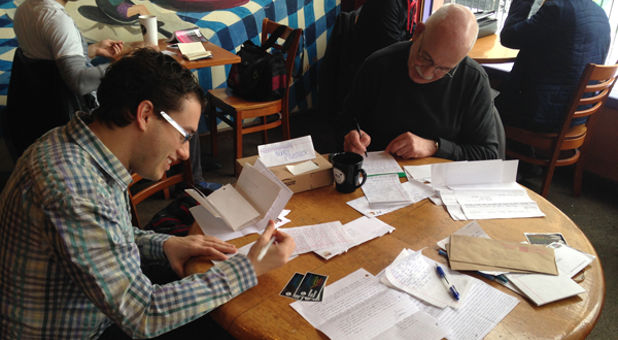Atheists Head Into Christian Mission Fields With False Gospel
Leslie Zukor was a 19-year-old student at Reed College studying prison rehabilitation programs when something jumped out at her.
While there were programs tackling drug abuse, physical and sexual abuse, technical training, and more, all of them were offered by faith-based organizations. Where were the options for those behind bars who are atheists, like her?
“Not all prisoners are religious, and I wanted them to know that to turn your life around and be a good and productive member of society does not require a belief in God,” she said. “I just thought, wow, it is time to see about getting other perspectives in there.”
So Zukor launched the Freethought Books Project, collecting books about atheism, humanism and science and sending them to interested prisoners. She estimates that since her first book drive in 2005, she has given out 2,300 books, magazines and newspapers to perhaps hundreds of prisoners across the country.
Now, the program is experiencing a mass expansion. Late last year, Zukor, now a 28-year-old Seattle-based photographer and artist, handed it over to the Center for Inquiry, a national organization of humanists based in Amherst, N.Y. Since then, hundreds of books have poured in, including entire cartons sent by publishers and authors.
With the growth comes attention, not all of it positive. A number of Christian and conservative pundits have decried the project as seeking to “battle the Bible” and “turn inmates against God.” But Zukor and other nonbelievers—the “freethinkers” of the project’s name—say they have no such motives.
“Christianity has a mandate to convert people, but freethought does not have any such mandate,” said Sarah Kaiser, one of the project’s two new coordinators. “We just want everyone to have the freedom to express doubts and ask questions, and that is what these books represent.”
The Freethought Books Project has always been a small operation. While Zukor collected and sent out reading material from the Pacific Northwest, Joel Justiss, a San Antonio-based software developer, helped her identify interested readers through a secular newsletter he sent to prisoners. Justiss is a member of the Brights, a national organization of nontheists with a naturalistic worldview.
“The Brights have no resources to send books to people, so when I found out what Leslie was doing I said this is just what my people are asking for,” Justiss said. He sent each interested inmate a packet of material that included a page about the Freethought Books Project and forwarded their book requests to Zukor.
Justiss, who became a nonbeliever after 40 years as a Christian, said the need for nonreligious reading matter is high. The prisoners who write to him often describe being treated differently because they are not Christian, he said.
“Lots of times they complain, (that) we are excluded from the special benefits that religious prisoners have and we take a lot of flack from other prisoners as well as guards for being unconventional,” he said. “They say things like prisoners are some of the most religious people on earth.”
Under CFI, project organizers will still work with the Brights, but they will also seek additional ways to identify and contact prisoners, Kaiser said. The Bureau of Justice Statistics counted 6.9 million adults in the correctional system nationwide in 2012. The estimated number of incarcerated atheists ranges from .07 percent to .2 percent of all inmates.
“This means that atheists in prison are even more of a minority” than they are on the outside, Kaiser said, and therefore have a greater need for support. A 2012 Pew Research Center study found atheists and agnostics make up 5.7 percent of the general population.
So what’s on the Freethought Books Project’s reading list? When prisoners ask for basic information, Kaiser sends them “What Is Secular Humanism?” by the late Paul Kurtz, the founder of CFI and a major interpreter of contemporary humanism, or “Faitheist” by Chris Stedman, assistant humanist chaplain at Harvard University.
Other donations include “Trusting Doubt” by Valerie Tarico, “A Manual for Creating Atheists” by Peter Boghossian and “The Skeptic’s Annotated Bible” by Steve Wells.
Not all those who request the books are nonbelievers. Kaiser said she received a letter from one inmate that read “God bless the Freethought Books Project” and contained a pledge to pray for more books to be donated. “There is definitely a contingent of prisoners who are religious but interested in knowing what freethinkers are all about,” she said.
The project will also expand to include a pen pal program, pairing inmates with nonbelievers on the outside. And while conservatives condemn the program, it’s drawn praise from prisoners.
“I thank you again for your infusion of sense into an environment that is, at best, utterly nonsensical,” one inmate recipient wrote. “It is heartening to see an alternative point of view represented in such a place and the books you’ve sent will be read and re-read many times over.”
Copyright 2014 Religion News Service. All rights reserved. No part of this transmission may be distributed or reproduced without written permission.














































